 |
Photo of La Batalla de Vitoria by MrsBrown at
https://pixabay.com/photos/la-batalla-de-vitoria-statue-image-4710733/ |
This world history resource focuses on the French Revolution
and Napoleon during 1789 to 1815 and includes quiz questions
and answers and video links to related topics.
I utilized World History: Patterns of Interaction (Holt McDougal)
for our world history textbook. It has multiple options for
different learning styles and covers a wide array of information.
This quiz accompanies Chapter 23: pages 648-677.
Directions for the quiz:
- Scroll down and click on the thumbnail to enlarge to full screen.
- Click on the graphic to advance to the next screen.
- Choose an answer for each question.
- Compare your answers with those provided.
If you are interested in a group and/or interactive version of this quiz,
log in to Kahoot! and search for Week 23 World History by Katrena.
Below are free videos to accompany chapter 23:
Thanks for visiting my Student Survive 2 Thrive blog.
Navigate my blog easily through my site map, topics
tabs on the right, or via my search bar.
Here are a few of my articles you may also find helpful this week:
 |
| World History Week 23 The French Revolution and Napoleon 1789-1815 |
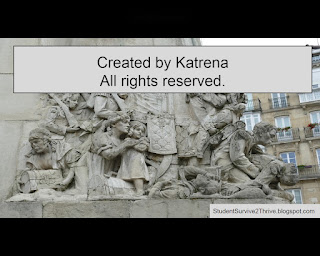 |
| Created by Katrena. All rights reserved. |
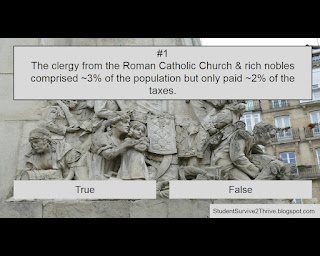 |
The clergy from the Roman Catholic Church & rich nobles
comprised ~3% of the population but only paid ~2% of the taxes.
Answer choices include: true, false |
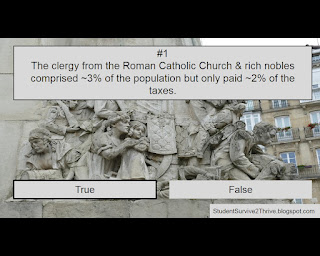 |
| The correct answer is true. |
 |
In the 1700s, ~80% of the population in France’s Third Estate
were the ___, who paid ~½ their income in dues to nobles,
tithes to Church, & taxes to king’s agents.
Answer choices include: bourgeoisie, soldiers, peasants, clergy |
 |
| The correct answer is peasants. |
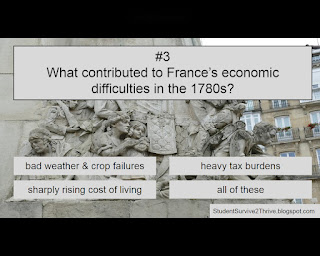 |
What contributed to France’s economic difficulties in the 1780s?
Answer choices include: bad weather & crop failures,
heavy tax burdens, sharply rising cost of living, all of these |
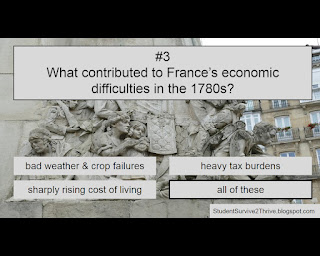 |
| The correct answer is: all of these. |
 |
Which is TRUE of Louis XVI?
Answer choices include:
He was a strong and decisive leader.
He thought skilled trades like bricklaying & metalworking were a waste of time.
He sincerely wanted to improve the lives of the common people.
He immediately cut expenses to avoid having the country to run out of money. |
 |
| The correct answer is: He sincerely wanted to improve the lives of the common people. |
 |
Why was Marie Antoinette unpopular with the French people?
Answer choices include:
She was a member of the royal family of Austria, France’s long-time enemy.
She refused to wear tight-fitting clothing & introduced a loose cotton dress for women.
She often interfered in government & offered Louis poor advice.
All of these |
 |
| The correct answer is all of these. |
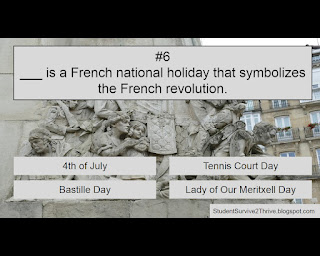 |
___ is a French national holiday that symbolizes the French revolution.
Answer choices include: 4th of July, Tennis Court Day,
Bastille Day, Lady of Our Meritxell Day |
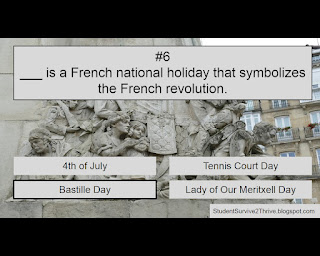 |
| The correct answer is Bastille Day. |
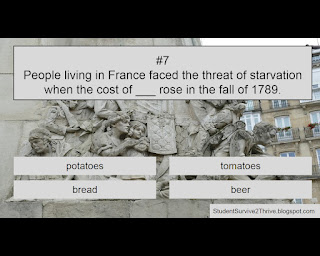 |
People living in France faced the threat of starvation
when the cost of ___ rose in the fall of 1789.
Answer choices include: potatoes, tomatoes, bread, beer |
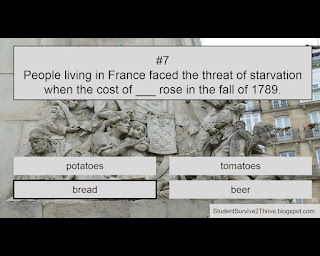 |
| The correct answer is bread. |
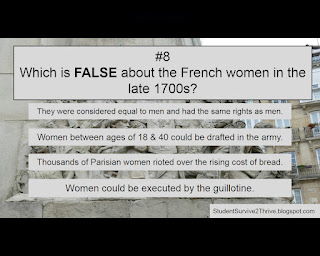 |
Which is FALSE about the French women in the late 1700s?
Answer choices include:
They were considered equal to men and had the same rights as men.
Women between ages of 18 & 40 could be drafted in the army.
Thousands of Parisian women rioted over the rising cost of bread.
Women could be executed by the guillotine. |
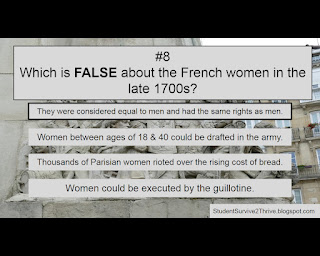 |
| The correct answer is: They were considered equal to men and had the same rights as men. |
 |
___ suffered from a painful skin disease & sometimes wrote
his/her revolutionary writings while in the bathtub.
Answer choices include: Charlotte Corday,
Maximillien Robespierre, Emmanuel-Joseph Sieyes, Jean-Paul Marat |
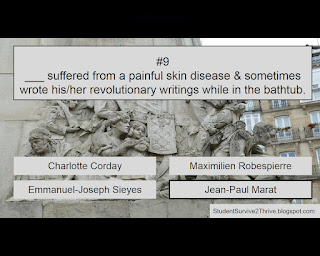 |
| The correct answer is Jean-Paul Marat. |
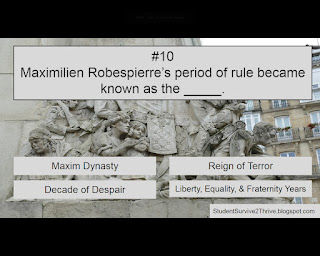 |
Maximilien Robespierre’s period of rule became known as the _____.
Answer choices include: Maxim Dynasty, Reign of Terror,
Decade of Despair, Liberty/Equality/Fraternity Years |
 |
| The correct answer is Reign of Terror. |
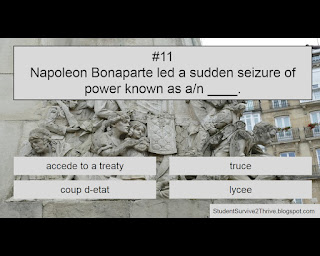 |
Napoleon Bonaparte led a sudden seizure of power known as a/n ____.
Answer choices include: accede to a treaty, truce, coup d-etat, lycee |
 |
| The correct answer is coup d-etat. |
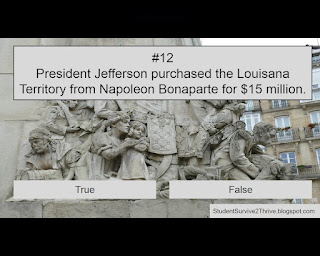 |
President Jefferson purchased the Louisana Territory
from Napoleon Bonaparte for $15 million.
Answer choices include: true, false |
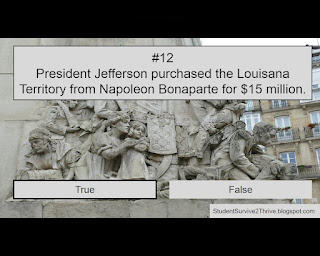 |
| The correct answer is true. |
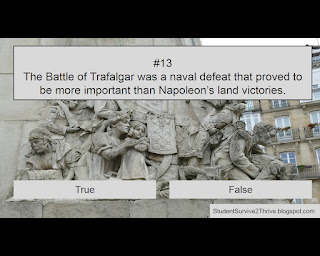 |
The Battle of Trafalgar was a naval defeat that proved to be
more important than Napoleon’s land victories.
Answer choices include: true, false |
 |
| The correct answer is true. |
 |
In 1806, Napoleon forced all ports to close to prevent trade
& communication between Great Britain & other European nations.
This was called the ____.
Answer choices include: Portsmouth Punishment,
Continental System, British Blocade, Post War |
 |
| The correct answer is Continental System. |
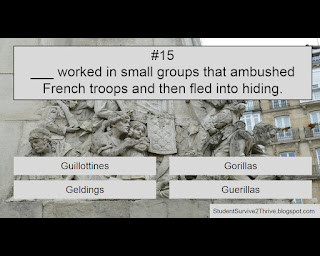 |
___ worked in small groups that ambushed
French troops and then fled into hiding.
Answer choices include: Guillotines, Gorillas, Geldings, Guerillas |
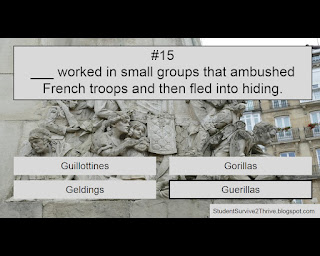 |
| The correct answer is Guerillas. |
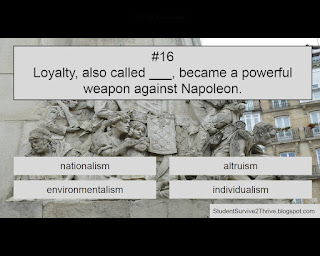 |
Loyalty, also called ___, became a powerful weapon against Napoleon.
Answer choices include: nationalism, altruism,
environmentalism, individualism |
 |
| The correct answer is nationalism. |
 |
Where was Napoleon defeated in 1815?
Answer choices include: Waterhole, Wellington, Waterloo, Wales |
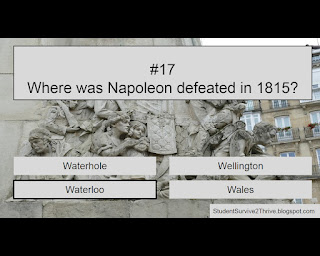 |
| The correct answer is Waterloo. |
 |
The ___ created a time of peace in Europe that lasted nearly 40 years.
Answer choices include: Emancipation Proclamation,
Congress of Vienna, Electoral College, Roman Empire |
 |
| The correct answer is Congress of Vienna. |
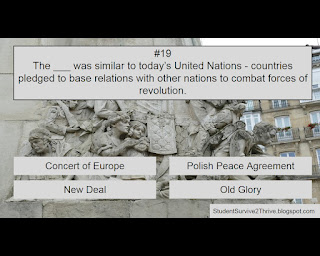 |
The ___ was similar to today’s United Nations - countries pledged
to base relations with other nations to combat forces of revolution.
Answer choices include: Concert of Europe, Polish Peace Agreement,
New Deal, Old Glory |
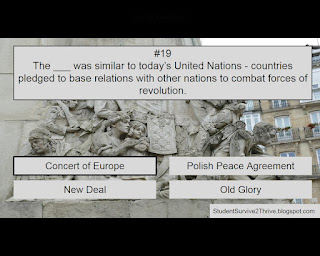 |
| The correct answer is Concert of Europe. |
 |
After 1815, more and more people saw democracy as
the worst choice to ensure equality & justice for all.
Answer choices include: true, false |
 |
| The correct answer is false. |
 |
| Find more resources at StudentSurvive2Thrive.blogspot.com |












































No comments:
Post a Comment
Thanks for reading my article and sending your comment! Please note that I do not place links to other web sites on this blog.
Note: Only a member of this blog may post a comment.